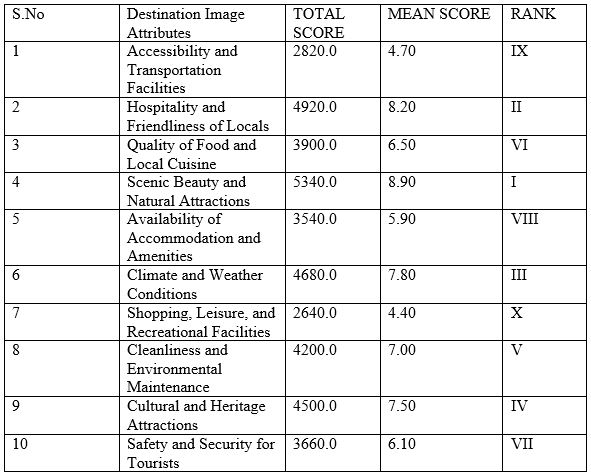Scenic Impressions and Lasting Experiences: A Study on the Impact of Destination Image on Tourist Satisfaction in the Nilgiris
DOI:
https://doi.org/10.5281/zenodo.16735099Keywords:
destination image, tourist satisfaction, garret ranking technique, nilgiris tourism, visitor perceptionAbstract
The image of a destination plays a pivotal role in shaping tourist satisfaction and influencing their choice of travel. This study explores the dynamic relationship between the perceived image of the Nilgiris – a scenic and culturally rich hill district in Tamil Nadu – and the level of satisfaction experienced by its visitors. With growing competition among tourist destinations, understanding what truly matters to travelers is crucial for sustainable tourism development.To uncover these insights, data was collected from 600 tourists visiting various parts of the Nilgiris, including Ooty, Coonoor, and Kotagiri. The study employed the Garret Ranking Technique, a robust statistical tool that enabled the prioritization of various factors influencing destination image such as natural beauty, hospitality, cleanliness, accessibility, local culture, food, and safety. Respondents were asked to rank these attributes based on their travel experience. The Garret score conversion allowed the identification of key dimensions most valued by tourists, thereby revealing the strongest contributors to their overall satisfaction. Findings highlight that natural scenery and pleasant climate ranked highest among tourist preferences, followed closely by local hospitality and cultural richness. On the other hand, aspects like infrastructure and traffic management were ranked lower, indicating areas needing improvement. The study underscores the importance of enhancing destination image holistically, as even one weak link can affect tourist perception and repeat visits.This research offers practical insights for tourism planners, local authorities, and hospitality stakeholders in the Nilgiris to strategically strengthen and promote destination elements that elevate tourist satisfaction and foster long-term loyalty.
Downloads
References
Kim, J.-H., Ritchie, J. R. B., & McCormick, B. (2022). Emotional linkage between destination image and tourists’ satisfaction. Journal of Travel Research, 61(5), 1021–1036. https://doi.org/10.1177/0047287522108821
Zhang, H., Fu, X., Cai, L. A., & Lu, L. (2021). Destination image and tourist loyalty: A meta-analysis. Tourism Management, 85, 104291. https://doi.org/10.1016/j.tourman.2021.104291
Stylidis, D., & Cherifi, B. (2020). Destination image: A comparison between first-time and repeat visitors. Journal of Travel Research, 59(6), 1129–1145. https://doi.org/10.1177/0047287519851219
Glover, T. D., & Filep, S. (2021). Humanistic tourism: Exploring emotional dimensions of destination experience. Tourism Recreation Research, 46(3), 314–325. https://doi.org/10.1080/02508281.2021.1895731
Ramkissoon, H., & Mavondo, F. T. (2021). Enhancing tourist satisfaction through place attachment. Annals of Tourism Research, 86, 103100. https://doi.org/10.1016/j.annals.2020.103100
Dr. S. Ayyappan,Dr. M. Sakthivadivel,Dr. S. Kanthimathinathan, & Dr. Sivaraman K. (2025). I-powered risk assessment models in financial management: Enhancing accuracy and efficiency in corporate finance – A case study-based approach. Provincia Journal (TELEMATIQUE), 24(01), 960-968.
Prayag, G., & Hosany, S. (2020). Affective destination image and its influence on tourist behavior. Journal of Hospitality & Tourism Research, 44(1), 64–87. https://doi.org/10.1177/1096348019874225

Published
How to Cite
Issue
Section
ARK
License
Copyright (c) 2025 K Muthukumar, S Saravanakumar

This work is licensed under a Creative Commons Attribution 4.0 International License.
Research Articles in 'Applied Science and Engineering Journal for Advanced Research' are Open Access articles published under the Creative Commons CC BY License Creative Commons Attribution 4.0 International License http://creativecommons.org/licenses/by/4.0/. This license allows you to share – copy and redistribute the material in any medium or format. Adapt – remix, transform, and build upon the material for any purpose, even commercially.










